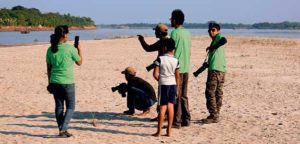Archan Mitra
Living in a rectangular1 world we seldom encounter life-changing events until we make the effort to step out of the boundary. We all know that the virtual environment has its limits but we tend to cling to it. This article will provide you with a blueprint on how to learn from travelling2 and break the shackles of a rectangular education and travel to a more flexible system of education. A pioneer (Dewey, 1983)3 in the field of learning had inferred from his research that learning through experience helps a person deal better with subsequent events in his life. We teachers taking students on fieldtrips try to give them different experiences so that they grow on three fronts – mind, body and soul. I’d like to share with you a fieldtrip that my students and I went on to Noachar.
Noachar is a river ecosystem surrounded by a bush forest. The place comprises various islands populated by both man and animal. There are over 400 species of insects, 150 species of birds, 80 species of fish, 50 species of reptiles and 10 species of mammals. Noachar is new, hence ‘noa’, and it is an island on the Ganges, hence ‘char’, therefore the name ‘Noachar’ or the new islands. These new islands are home to some of the most majestic creatures on the planet. They stretch hundreds of kilometers to the north and south. The boat is the only viable means of transportation for the villagers here. The villages are home to tribal people who migrated from other states in search of land. Food is in plenty as there are a lot of fish. The simplicity of life is remarkable as is the wildlife found here. The red jumping spider, giant cricket, pratincole, brahmini duck, ruddy shell duck, blue-tailed bee-eater, red munia, pied kingfisher, Gangetic dolphins, green vine snake, Russel’s viper, spectacled cobra, mono spectacled cobra, banded krait, fishing cats, Asiatic golden jackal and many more. It is impossible not to fall in love with this place.

Travelling experience I: The primary phase of the journey is the road trip you take to Noachar. It is both historic and religious; you cross Nabadwip and Mayapur, cities rich in heritage and culture. This will help students get an idea about the people and their religious ties.
Travelling experience II: This phase of the journey includes the village Noachar, which is unique because it is situated on an island on the Ganges. It is one of the few river island villages in India, and therefore can become a good case study.
Travelling experience III: Day trips from Noachar include a few places with unique features:
- Noachar is the only place on the planet where you find schools of Gangetic Dolphins. Ganesh Chowdhury, who is a national award winner in photography, works as a naturalist in conserving these species, so the students get a lot of insight.
- There is a village about 3-5 km from Noachar, which is considered as the snake village as people here co-exist with wild snakes. They sleep, eat and do all their daily chores unaffected by the snakes. Again a good case study on how man and animal can co-exist without conflict.
- Ox-Bow lake is a one day visit on boat from Noachar. If the fieldtrip is planned during winter, one can witness the highest number of migratory birds here. Students can study the behaviour of these birds up close and learn more about them.

Travelling experience V: Listening and watching baul sangeet being performed is also an enriching experience for the students. Noachar provides a platform for this endangered form of art. Students can learn about the life and culture of the bauls.
Noachar is a land of plenty, the more you explore the more you can learn through experience. WildReaction*, an independent organization, is promoting Noachar and its wildlife. The organization provides travelling support and bridges the communication gap between the people of Noachar and the rest of West Bengal. Teachers and students who are interested in undertaking a fieldtrip to Noachar can contact WildReaction.
*WildReaction is a voluntary organization started as a sister concern under the registration of “AnkaSekhaChandernagore” West Bengal Societies registration ActS/2L/4307. It is a Non Government Organization that caters to rural wildlife protection. You can visit them on facebook: https://www.facebook.com/wildreaction/
References
1. The word rectangle is used as a metaphor for classroom, smart phone, laptops, PCs etc. which are all rectangular in shape.
2. Alternative academic term: experiential learning.
3. Dewey, J. (1938). Experience and Education. New York: Macmillan.
The author is Assistant Professor of Media Science Department at iLEAD. He is also pursuing his PhD in environmental communication from Visva Bharati Santiniketan Centre for Journalism and Mass Communication. His research interests are science communication, new media, and animal-human communication. Being a co-founder of WildReaction he works with the notion of tourism for a cause. He can be reached at archan6644@gmail.com.
